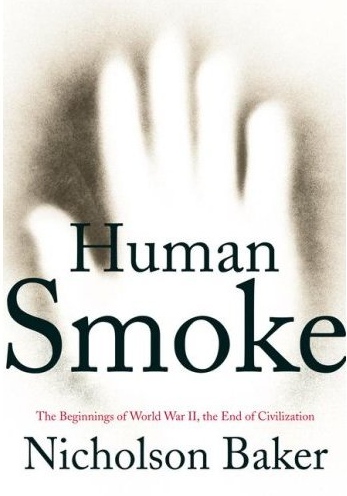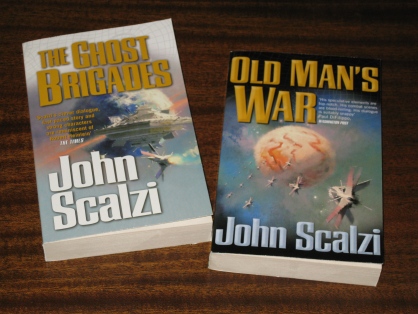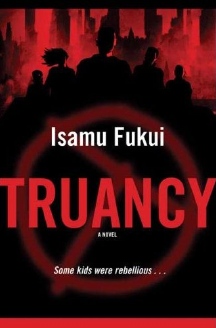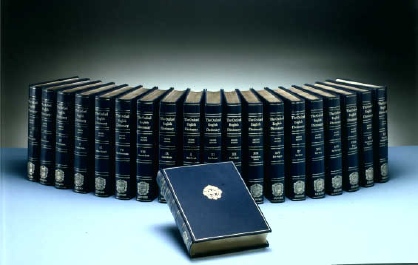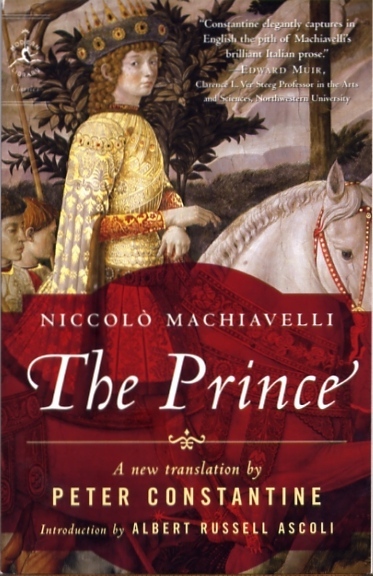|
|
|
|
This Just In...News
From The Agony Column
|
| |
|
04-04-08: Update: Rudy Rucker and the LHC Lawsuit on NPR
|
Tipping the Universe
Oh, the sausage stories
I could tell about putting this report together. But suffice it to say,
when I saw the
Register headline, I knew I had to do something on this. So I managed
to look up plaintiff Walter Wagner,
then found Stanford physicist Savas
Dimopoulos and finally brought in Rudy
Rucker. It was really a whirlwind ride, pitching the story
on Tuesday and turning it in on Thursday. Here's
a link to the NPR Web Page. As ever, please email this story to as
many people as you can, to help support this column. Cheaper and safer
than Paypal, and hey, I dont want your money – I just want
to make sure you spend it on the right books. You hear Rudy Rucker in
this piece and I guarantee that you'll want 'Spaceland' and the rest of
his oeuvre. Assuming the world is still around for you to read in.
|
| |
|
04-04-08: Nicholson Baker's WWII ; Agony Column Podcast News Report
: NPR First Books Toby Barlow
|
The Maximum Minimalism
of 'Human Smoke'
|
The
ghostly hand of history. |
Nicholson Baker
is another of our generation of minimalists, joining Chuck Palahniuk in
doing more with less. Novels like 'Vox' and 'The Fermata' used few words
to tell powerful stories. He exposed what Publisher's Weekly called "an
Orwellian universe" with 'Double Fold,' a look at libraries, newspapers
and archives being tossed down the Big Swirly. He's back with another
non-fiction title, 'Human Smoke: In the Beginnings of World War II, the
End of Civilization' (Simon & Schuster ; March 11, 2008 ; $30), a
look at the pericalypse that came to pass before the second World War.
The end of the world, buried in news clips from the past, proves to be
as fascinating as you might think.
Baker's approach is alarmingly simple. He just nabs 471 pages of vignettes
from the years preceding Pearl Harbor and la them out one after another
in a series of heartbreaking, mind-boggling revelations. It's a fascinating
contrast. The clips are one paragraph long and none run longer than a
single page. And by themselves, they're not overwrought or perfervid.
They're simple, clear and often chilling in their bland presentation.
But talk about the whole versus the sum of the parts ...
Baker's vision is vast, and his research is simply amazing. But its
his artistry that's on display here as much as history. Juxtaposition
has never been given this sort of workout before. The history exposed
and counter-posed with more history offers readers the chance to put together
a picture of something no less important than the Apocalypse and the Holocaust,
the daily grind and the end of the world as we think we know it. The care
that goes into crafting each passage is incredible; in some ways, this
is the epic poem of the twentieth century. But it's so incredibly readable,
so compelling in the way the bits and clips draw the reader in, that it
surpasses poetry as it uses the new tool of the twentieth century, the
sound byte. Just pick this book up and let it carry you away into the
past and into the future. It will change the world around you, one small
story at a time.
|
Agony Column Podcast
News Report : NPR First Books Toby Barlow : 'Sharp Teeth' Gives Werewolves
an Epic Treatment
I'm concluding this
week's podcast with a high-quality
MP3 of the Weekend Edition Sunday First Books report on Toby Barlow's
Sharp Teeth. As with yesterday's podcast, I
have to thank many listeners who hit the web page and used the "Email
this Page" button. And I have to go back and retroactively thank
the folks at NPR who built out such gorgeous web sites for this and the
Machiavelli story, as well as Toby Barlow, Jennifer Barth and Charlie
Huston, who first told me about this book. Having recently returned to
LA for a couple of interview you'll see in the coming weeks, I have to
say that Barlow captured the wild, urban wilderness with an eerie ease.
And no, I didn't see a single dog while I was there – at least,
not in canine form.
|
| |
|
04-03-08: Gateway Drug Books : Hooking the Unwary on Science Fiction
; Agony Column Podcast News Report : NPR All Things Considered Report
|
Hooking the Unwary on Science Fiction
Every science fiction
reader gets hooked, and usually – though not always – at an
early age. Most genre readers know the obvious choices. For me, it was
Arthur C. Clarke. When the movie 2001: A Space Odyssey
was coming out, I bought the Life magazine that had all the pre-production
paintings and 'Childhood's End'. And that was that.
Now some mumble-mumble years later, I'm a junkie, and like any good junkie,
I want to addict the next generation. And while I know that generation
after generation has fared just fine with the likes of Arthur C. Clarke
and Robert A. Heinlein and Ray Bradbury, I'm going to take the time now
and again to point out newer gateway drugs that might lure the unsuspecting
mind away from mundane reality and into the crazy-quilt world of science
fiction. Or, depending on your perspective, back to a more measured and
informed view of reality.
All this was spurred by a simple sight; mass-market paperback copies of
John Scalzi's 'Old
Man's War' and 'The
Ghost Brigades' sitting on my bookshelf. I looked at them and thought,
"You know, if I wanted to turn someone on to science fiction who
had never read SF, here are some totally contemporary Gateway Drug Books."
It seems a bit simplistic, but there are a few conditions that go into
making these ideal Gateway Drug Books.
First and foremost, Gateway Drug Books needs must be short, snappy, and
well written. Obviously, 'Old Man's War' and 'The Ghost Brigades' are
all three. They clock in a just over 300 pages, so they dont look
imposing when you hand them to your prospective addict. As for snappy
and well-written, you can check my reviews, and I think that, should you
look about o the web, you'll find my enthusiasm for these books is by
and large shared.
But good books and short books are not that uncommon. What Scalzi brings
to the table is an accessibility and a familiarity that will grab reader
who would never have thought they'd enjoy science fiction. Now, as much
as we might hate to admit it, most of the world thinks of *wars as science
fiction. I'm not here to debate the merits of that particular body of
work, but I will suggest that it helps rope in the prospective addict
if the work in question might be perceived as vaguely like that particular
item. And Scalzi's books deliver that, big-time and better than big-screen.
They're action packed but character driven; and the battle scenes will
rattle your sensibility no matter how comfy that couch is.
There's one other thing that Gateway Drug Books need; they need to be
mass-market paperbacks that you can just give way with no qualms, that
you can envision being dropped in the bath or being caught up in a wave
that comes up father than expected on a sunny summer day. Of course, Tor
delivers; not just the MMPB format, but the crucial cover art. Funny how
the future in space is timeless, no? I mean you look at those illustrations,
and they could have graced an E. E. "Doc" Smith book, a Heinlein
juvenile, or a mid-sixties Frank Herbert novel, or beyond. The art that
graces these covers is science fiction art that evokes the mood but doesn't
frighten the potential audience. In fact, it invites us in like any good
addictive agent would do. It suggests that should we yield to the words
within, we might experience similar visions. Wonder. Awe. Excitement!
Science Fiction – played across the big screens of our tiny minds.
Minds big enough, however, to get addicted to the best of all possible
drugs – reading.
|
Agony Column Podcast
News Report : NPR All Things Considered Report : "Machiavelli,
Not Such a Bad Guy?"
Today we conclude
our run on Machiavelli with
a podcast of a high-quality MP3 version of my report for NPR. I'd
like to take this moment to thank all involved; Albert Ascoli
and Peter Constantine, as well as their publisher's rep
MB. And of course, Dr. Katrin Thier
of the Oxford English Dictionary. While I wish the report could have been
longer, we've covered that ground in the previous podcasts, and as it
happens, if shorter gets the report a)aired and b)heard, that's why we
have editors, and in my case, my editor is most assuredly a gem. And finally,
I need to thank everyone who hit the "Email this Page" button.
Your Agony Column Podcast was much bolstered by the strong response and
even as I write this I've got some great stuff in the hopper. Soon, back
to your regularly scheduled apocalypse.
|
| |
|
04-02-08: Isamu Fukui Calls for 'Truancy' ; Agony Column Podcast News
Report : Oxford English Dictionary Etymologist Dr. Katrin Thier
|
"We Dont
Need No Education"
|
Teacher,
leave your kids alone. |
If you think YA fiction
is all about witches and warlocks, or science fiction and spaceships,
or vampires, or whatever element of the fantastic will hold young attention
spans, think again. Isamu Fukui was like fifteen when
he wrote 'Truancy' (Tor Books / Tom Doherty Associates ; March 4, 2008
; $16.95) and it offers none of the usual comforts of twenty-first century
teen lit. No magic powers sort out everyone's problems. There's no comforting
feel that this could not be our world because it includes vampires, or
supernatural critters. In fact, there's precious little comfort whatsoever
in Fukui's narrative. Though it's not mystery fiction, there's a hardboiled
feel to the writing. Set in a mythic reduction of New York called simply
"the City", 'Truancy' takes a hard look at school and doesn't
like what it sees. No, let's not mince words; Fukui pretty much hates
school and everything it stands for, and he gives it a fist to the face
before he follows up with knives, guns, explosives and more violence and
dead bodies than a Hollowood action flick. I wont pretend that
'Truancy' is perfect; it's a bit over-written, and there are in fact some
fantasy elements – mostly male-student revenge fantasy elements,
to be precise. But Fukui's work has just the right ring of the fable,
just enough absurdity to keep it fresh. It also has as much energy as
a roomful of restless students on a rainy day. Its fearless to
the point of fun – and more. You
can read my in-depth, spoiler-free review here.
|
Agony Column Podcast
News Report : Oxford English Dictionary Etymologist Dr. Katrin Thier:
"Match-Villain"
Alas, her contributions
to the NPR Report on Machiavelli fell to the cutting room floor at the
very last minute, but my interview with Oxford English Dictionary
Etymologist Doctor Katrin Thier is here for your podcasting delight.
Of course, we talked about the etymology of the word Machiavellian, and
I learned that his name was punned into "match-villain" –
and quite a bit more besides. But while I had her on the line, I also
asked about the OED in general, and how much they had online in their
immense libraries and databases. Fancy a peek inside the world's best
English Dictionary? Here's
your MP3 Link.
|
| |
|
04-01-08: A 2008 Interview with Peter Constantine
|
"The slangy,
with-it expression at the time for somebody who is evil"

|
|
|
With-it before it existed. |
Following on from yesterday,
we continue our examination of the word "Machiavellian" and
the work of Niccoló Machiavelli. Today's podcast is my conversation
with translator Peter Constantine, who captured the rhythms
and elegance of Machiavelli's language in the most recent translation
of 'The Prince' (Modern Library / Random House ; February 5, 2008 ; $8).
Constantine is not simply a consummate translator; he's a scholar who
brings a deep understanding of Machiavelli and his history to the translation
process. It was Constantine who first told me that "Machiavellian"
was an insult before 'The Prince' was translated – and you'll hear
my surprise at this revelation.
Constantine is an eloquent speaker and offers some incredible insights
into the creation, reception and implications of 'The Prince' in
this MP3 of our interview. One of the great delights of this project
was speaking to these experts and learning so much I did not know. In
the course of an interview, one generally thinks one has a clue as to
what the answer to any given question will be; but these interviews were
as much about research as they were about conversation. This project was
a learning experience and the interviews were rather different from the
usual conversation with an author about a new book. I didn't know or even
have an inkling sometimes as to what I'd find out; I was fortunate to
have such literate (and polite!) resources to explore the complex subject
of Machiavelli's 'The Prince'.
Behind all of this is the work itself. Let me assure readers that 'The
Prince', in this translation, is a revelatory experience. I did look at
other translations, but I found they did not have the music that this
one has, the straightforward clarity that captures the power of Machiavelli's
message, ambiguous as it is. You'll read this book in a day, probably
in a single sitting, although you'll probably have to get up and walk
around a few times just because the insights of Machiavelli seem so pertinent
to this dreadful day and age. I'm not going to list off all the aphorisms
that he unspools in the course of this book; the content has been dissected
for centuries and, as Peter Constantine suggests, probably will continue
to be analyzed for centuries to come. But for the reader, this book offers
one jolt of pleasure after another, as Machiavelli de-constructs the precepts
of conquest and rule with a ruthlessly realistic vision of human behavior.
He's funny, pithy beyond compare and so admirably terse, you'll wonder
why contemporary writers of political treatises dont take a page
from 'The Prince' and just get to the point. Of course, as you'll learn
when you read (or re-read, in this translation) 'The Prince', the chances
are that point was already covered by Machiavelli.
Readers (like myself) who find 'The Prince' enchanting and compelling
are pointed to an additional volume; 'The Essential Writings of Machiavelli'
(Modern Library / Random House ; April 3, 2007 ; $17.95), which includes
'The Discourses,' described by many as being an essential follow-up to
'The Prince'. Ascoli provides an introduction and the translation is by
Constantine, so the quality is the same, but the scope is expanded. It
does include a complete translation of 'The Prince', but to my mind, the
slim volume containing only that work is a better – less imposing
– way to experience it. And once you whip through that, you'll be
ready to dip into 'The Essential Writings.' It's nice to think that 'The
Prince' is now a part of the canon of classical literature that Machiavelli
himself drew upon – and strange to think that Machiavelli, who brought
a unique and timeless literary flair to political writing himself started
as a politician.
|
| |
|
03-31-08: A 2008
Interview with Albert Russell Ascoli
|
"Machiavelli himself
wasn't Machiavellian"
This week, I'm privileged
to take you on a journey deep into the work and mind of Niccoló
Machiavelli, with the help of Professor Albert Russell
Ascoli, Peter Constantine and Dr. Katrin
Thier. I spoke to each of these luminaries in preparing my report
for NPR, and I'm happy that here on my podcast I can give each of them
a much larger chuck of time to speak. I'm glad that NPR
let me do this report, and I think the finished piece turned out swell;
now, for the literary, the political and the curious, it's time to dive
in and get all the details about this extraordinary work and man.
Today's podcast is my conversation with Albert Russell Ascoli, who wrote
the Introduction to the new translation of 'The Prince'. Here's
a link to the MP3. Professor Ascoli digs into the social and political
background against which 'The Prince' was written; he's as entertaining
as the man he speaks about so eloquently.
For many, and for me, the appeal of 'The Prince' is the straightforward
simplicity with which it speaks to problems that stymie progress in the
21st century as surely they did in the 16th. I wonder, however, what Machiavelli
might have made of the import of such problems in a world where man can
quite easily bring about his own extinction, either swiftly with atomic
warfare or slowly with global warming – better known as "boiling
a frog." He'd certainly be getting a lot of hits on his website!
|
| |
|
|



